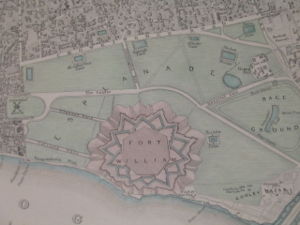Fort William: Difference between revisions
+pic |
adding details |
||
| Line 1: | Line 1: | ||
[[Image:Fortwilliamplan.jpg|thumb|300px|right|Plan of Fort William, 1844]] | [[Image:Fortwilliamplan.jpg|thumb|300px|right|Plan of Fort William, 1844]] | ||
'''Fort William''' was the main military garrison in [[Calcutta]]. | '''Fort William''' was the main British military garrison in [[Calcutta]]. It is still in use today as the headquarters of the Indian Army Eastern Command. | ||
==The Old Fort== | |||
Named for William III of England, the fort was built at the beginning of the 18th century and was the site of the British factory at Calcutta. | |||
The original fort was further north but was relocated to the present site on the Maidan after the [[Battle of Plassey]]. | |||
==Construction== | |||
The new Fort William was built by [[Robert Clive]] at a cost of £2,000,000 and was completed in 1773. It is octagonal in shape and covers an area of 2 square miles. Three sides of the fort face the [[Hoogly River]] and there are six gates. | |||
==Garrison== | |||
Two infantry regiments were stationed at the fort, one British, one native, as well as a [[Royal Artillery]] company. | |||
==Buildings== | |||
Buildings inside the fort include: | |||
*St Peter's Church - the fort church built in 1828 | |||
*St Patrick's - Catholic Chapel built in 1857 | |||
*Military Prison | |||
*Governor's House - later used as the Soldier's Institute and the Garrison School | |||
[[Category:Locations]] | [[Category:Locations]] | ||
Revision as of 17:39, 4 May 2009

Fort William was the main British military garrison in Calcutta. It is still in use today as the headquarters of the Indian Army Eastern Command.
The Old Fort
Named for William III of England, the fort was built at the beginning of the 18th century and was the site of the British factory at Calcutta.
The original fort was further north but was relocated to the present site on the Maidan after the Battle of Plassey.
Construction
The new Fort William was built by Robert Clive at a cost of £2,000,000 and was completed in 1773. It is octagonal in shape and covers an area of 2 square miles. Three sides of the fort face the Hoogly River and there are six gates.
Garrison
Two infantry regiments were stationed at the fort, one British, one native, as well as a Royal Artillery company.
Buildings
Buildings inside the fort include:
- St Peter's Church - the fort church built in 1828
- St Patrick's - Catholic Chapel built in 1857
- Military Prison
- Governor's House - later used as the Soldier's Institute and the Garrison School